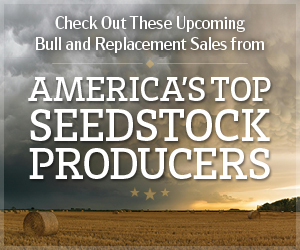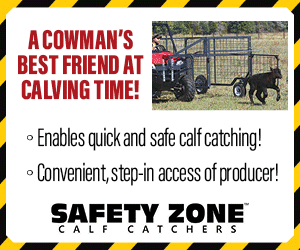A passion for cattle ranching helped this Wyoming rancher secure his family’s dream
Story and Photos by Kesly Porter Ellis
The first rays of the eastern Wyoming sun had just started to peek above the skyline and slowly stretched across the prairie spotlighting The Laramie Range, which rose high above the miles and miles of grass and sagebrush that surrounded me on every side. I turned on my blinker and switched lanes so I could take my exit then took a deep breath, soaking in the beauty of a new day. My change of direction gave me a bit of a new view, and in the distance I could see trees dotting the rolling hills of Dwyer, Wyoming.
Further down the road, a large white archway reading “Dwyer Cemetery” appeared, ‘Never a good sign when a town with no buildings has a cemetery’, I thought to myself as I gave a little chuckle at the implication of my thoughts. On the opposite side of the road was a wood sign with “Brickman Ranch, Doug and Anne, 4.6 miles North” proudly printed on weathered boards. The road was dirt, well maintained but somewhat narrow, and nothing but grass prairie and well-built barbwire fences stretched for nearly as far as I could see.
The sun had made its morning appearance, and its warm rays were already beating down as I began cinching my saddle onto a stout looking gray horse belonging to Doug and Anne Brickman. The horse was unfamiliar to me but stood well while I adjusted my saddle to fit.
“I figured the only proper way for you to see the ranch would be by horseback,” Doug, a middle aged man with a mustache covered smile said as he began putting a bridle on his young bay horse.
“I couldn’t agree more” I replied. I liked this guy already.
We began riding up a two-track road that wound down through some trees, across a creek and then eventually went up a large hill covered in juniper trees. The scene itself was breathtaking; a clear blue sky blanketed the trees and hills surrounding the hay meadows, big red shop, corrals and house that made up the Brickman Ranch headquarters, and there was a hint of fall in the air. It was like a completely separate world, a sanctuary that demanded a different, slower way of life, the definition of God’s country, really, and it created a feeling of freedom that makes a person glad to be alive.
“What got you started ranching, did this used to be your parents place?” I asked Doug, assuming him to be a fourth or fifth generation cowboy judging by the way he sat a horse, and what I had seen of his outfit so far.
“Actually no, I grew up back east,” Doug responded with a smirk that appeared on his face when he realized my surprise at his response. “My parents actually had nothing to do with agriculture.” Curiosity got the best of me now, and I listened intently as Doug reminisced about his childhood, his face twisted a little trying to decide where to start.
“My first real interaction with agriculture was when I was 16, I worked for a custom haying operation which I purchased from my boss and ran for awhile.” The sun-weathered cowboy was completely invested in the memories now, and pressed forward with the story. “I first came to eastern Wyoming when I was 20, full of dreams of being a cowboy even though I had no clue what that title meant,” his eyes lit up with the mention of his big plans, and then narrowed a little and he finished, “I didn’t even know how to halter a horse!” a laugh escaped him at the recollection of his naive self.
I rode along, a little in awe as I tried to envision a young man purchasing his first operation at 16, the same man who would eventually become owner and operator of the successful cow outfit I was now taking in. Such accomplishments take lifetimes, even generations.
My thoughts were interrupted as Doug stepped off his horse to close a gate that was open into a hay meadow. It was stretched tight, but he fastened it with experienced ease and we headed back to the dusty trail that led uphill between the trees. I could see red cattle in the distance now, and the land suddenly opened up to a large flat meadow, still surrounded by trees that seemed to serve as a barrier between the quiet serenity of the ranch and the outside world. Laramie Peak stood tall and proud at the center of attention, and I took a deep breath, soaking in the absolute beauty of my surroundings.
Doug’s voice deepened a little as we reached the top of the hill and he faced his horse the opposite direction, then sat, looked across his land and thought about his words carefully. “I learned something really quickly about this industry. If you want to make it in cattle ranching you have to have a passion for it, it’s not something that is just given to you… you have to earn it.” The confidence behind his words led me to believe that his life was a living testimony of that very statement.
Gratitude in his words
“It’s a miracle I have this place,” Doug said humbly as he spun his horse around and started to ride towards the far side of the pasture where the content Red Angus cows I had seen earlier from a distance were lazily lounging and grazing. Miracle? That choice of word caught me a little off guard; it seemed like “hard work” might have been a better phrase.
But Doug continued on, “It was God’s good grace that allowed me to purchase this place when I was 29. there was a low point in land prices, and a lot of outfits were struggling, which gave me the opportunity to put an offer in on this place.” The gratitude in his words, even after all these years, was evident and I immediately appreciated his humble matter-of-fact view on life.
We continued to ride and slowly gathered the cattle as we went; the Brickman’s were weaning calves that afternoon. A rider, Doug’s son Kent, could be seen on one of the ridgelines. His appearance created a twist in the conversation as Doug shared some stories of his family.
“I was homeschooled, and Anne and I homeschooled our kids as well. It was pretty hard to keep Kent focused at times, especially when the weather was nice out, he’d climb out his bedroom window and be out riding a horse somewhere.” Doug gave a good laugh now, and I wondered if he hadn’t helped Kent plan his escape, much to his mother’s dismay I was sure.
“My daughter, Karmen wanted to try public school one semester, but found she was learning more at home, and she also didn’t have to put up with any of the extra politics or drama. So public school didn’t last long. She’s married now, her and her family have some cows of their own and also train horses.”
Just then another rider came into view, Kent’s wife. Her long brown braid hung loosely down and a brown felt hat sat comfortably atop her head. She had a young baby, Hadley, in a harness strapped in front, and was leading a mule with another young passenger, Merit. The mule, Lucy, who Kent later explained had to be close to 40, was plodding along, head almost dragging the dirt as the three year-old boy in the saddle on top of her wiggled every direction and yelled out commands to the cows in front of him.
His hat was a little crooked on his head, and the brim was misshapen from riding the rough off of the rocking horse at home, no doubt. Merit’s face was covered in either some leftovers from a mid-morning snack, or dirt from his morning adventure, or quite likely both. He was in the middle of an intense lion hunt, his chap fringe gun gripped tightly between his fingers, but the game was forgotten and his big brown eyes lit up as a smile spread across his face at the sight of Doug. “Papa!”, he yelled excitedly as he waved for all he was worth, his stubby little fingers held high in the air. His mom, Kaelea, gave a little smile and then turned and said “Come Bye” to the two stock dogs she had raised that were trotting along near her horse’s feet. The pair jumped into action immediately and carried out her command.
Kent rode up closer now; he was young but had a mature air about him, although the mischievous window-escaping days of his childhood could still be seen as he greeted his wife and two kids. Then he trotted by to be sure the lead, which was out of sight partially down the hill, was headed the right direction.
The hay meadows were in clear view again now, and I asked Doug if they raise their own hay, to which he responded, “Yeah, and we actually raise some other crops too, and then in the winter we have a team we feed with.” Doug went on to explain a little about the teams he had owned, some of which were a little less than desirable. But he beamed proudly as he described his feeding wagon, one he had designed himself to make things go more smoothly. He assembled hydraulic arms, which function very similarly to hydra bed arms on the pickup, and mounted them to the back of his hay wagon. Then, the hay is stacked single high and facing the correct way in the stackyards, that way a tractor doesn’t even have to be started on the brisk mornings feeding the cows.
Chasing the next goal
‘For a guy who didn’t know how to halter a horse at age 20 Doug Brickman had sure come a long way,’ I thought to myself. He had purchased a ranch, built up a cowherd, raised a wonderful family, and was beginning to give back to the industry by creating things to make everyday tasks simpler. And his dreams kept growing. I could tell by the fire in his eyes that he was nowhere near done chasing his next goal.
The cows were filtering into the corral by now, and Kent reached down to fasten the gate shut. Then turned to his dad as the two discussed what the game plan should be.
“Let’s run up to the house and grab something to eat,” Doug said. Lucy the mule took his words as her cue and walked towards the barn door, then stood waiting for someone to remove her little passenger. Kent smirked at the mule and began to get Merit down as he explained, “I put a lot of miles on that mule when I was little, we even used her to gather wild horses.” Lucy was free now and walked into the barn and stood near the hitching post.
Inside the house I was greeted by a spunky woman with a welcoming smile, introduced to me as Doug’s wife Anne. She gestured for me to come into their home. The house itself was very pretty, as well as cozy and several mounts hung on the wall, each with a fun memorable hunting story to go along with it. A huge elk was suspended above the stairs.
“That one was shot here on the ranch!” Kent explained
I had guessed there were probably elk in the area, but this one was a serious monster and I was a little surprised at his response.
“We grew some corn this year, and we ended up with over 150 head of elk down here eating our crop. That elk is one of them.”
“Wow I bet it tasted good then, corn fed elk!” I added with a snicker.
The dining room and kitchen area opened up into a large family room. A huge grizzly bear rug covered the floor, and various pictures were spread across the walls.
“If you haven’t figured this out already, you should be informed that my husband is not your average cowboy,” Anne said with a twinkle in her eye.
I thought about her statement and tried to determine what she meant. Doug was a very accomplished rancher who thought outside the box, did whatever he had to do to take care of his livestock, and worked hard for what he had. But what could she mean by “not your average?”
Anne pointed to a medium-sized photo hanging on the wall, one I had not taken note of before. Inside the frame was what appeared to be a large boat, floating in a deep blue body of water. Completely perplexed I turned to Anne for an explanation.
“Doug built that boat,” Anne said as the pride welled up in her, and evidence of it spread across the smile on her face. “He built it right here on the ranch. We took it to a boat yard in Seattle, and that is where it is today. We have friends in the community there now who come down and visit us and the ranch every year. It’s really been lots of fun.”
A cowboy who built a boat…don’t that beat all? Most of the ranchers I know are afraid of getting in the bathtub, let alone the Pacific Ocean. My thoughts led me back to my earlier conversations with Doug; “If you want to make it in cattle ranching you have to have a passion for it, it’s not something that is just given to you, you have to earn it.” Doug had surely earned it, and his wife was right. Doug is not “your average cowboy”; but then again, is any cowboy really average?




